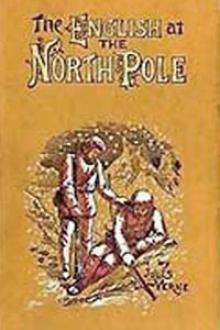The World of Ice - Robert Michael Ballantyne (best selling autobiographies TXT) 📗

- Author: Robert Michael Ballantyne
Book online «The World of Ice - Robert Michael Ballantyne (best selling autobiographies TXT) 📗». Author Robert Michael Ballantyne
Tom smiled. "Your voyage would be a long one if that were to happen. I daresay the Esquimaux would join with you in the wish, however, for their kayaks and oomiaks are better adapted for a calm than a stormy sea."
"Tom," said Fred, breaking another long silence, "you're very tiresome and stupid to-night, why don't you talk to me?"
"Because this delightful dreamy evening inclines me to think and be silent."
"Ah, Tom! that's your chief fault. You are always inclined to think too much and to talk too little. Now I, on the contrary, am always--"
"Inclined to talk too much and think too little--eh, Fred?"
"Bah! don't try to be funny, man; you haven't it in you. Did you ever see such a miserable set of creatures as the old Esquimau women are at Upernavik?"
"Why, what put _them_, into your head?" inquired Tom laughing.
"Yonder iceberg! Look at it! There's the nose and chin exactly of the extraordinary hag you gave your silk pocket-handkerchief to at parting. Now, I never saw such a miserable old woman as that before, did you?"
Tom Singleton's whole demeanour changed, and his dark eyes brightened as the strongly-marked brows frowned over them, while he replied, "Yes, Fred, I have seen old women more miserable than that. I have seen women so old that their tottering limbs could scarcely support them, going about in the bitterest November winds, with clothing too scant to cover their wrinkled bodies, and so ragged and filthy that you would have shrunk from touching it--I have seen such groping about among heaps of filth that the very dogs looked at and turned away from as if in disgust."
Fred was inclined to laugh at his friend's sudden change of manner; but there was something in the young surgeon's character--perhaps its deep earnestness--that rendered it impossible, at least for his friends, to be jocular when he was disposed to be serious. Fred became grave as he spoke.
"Where have you seen such poor wretches, Tom?" he asked, with a look of interest.
"In the cities, the civilized cities of our own Christian land. If you have ever walked about the streets of some of these cities before the rest of the world was astir, at gray dawn, you must have seen them shivering along and scratching among the refuse cast out by the tenants of the neighbouring houses. O Fred, Fred! in my professional career, short though it has been, I have seen much of these poor old women, and many others whom the world never sees on the streets at all, experiencing a slow, lingering death by starvation, and fatigue, and cold. It is the foulest blot on our country that there is no sufficient provision for the _aged poor_."
"I have seen those old women too," replied Fred, "but I never thought very seriously about them before."
"That's it--that's just it; people don't _think_, otherwise this dreadful state of things would not continue. Just listen _now_, for a moment, to what I have to say. But don't imagine that I'm standing up for the poor in general. I don't feel--perhaps I'm wrong," continued Tom thoughtfully--"perhaps I'm wrong--I hope not--but it's a fact, I don't feel much for the young and the sturdy poor, and I make it a rule _never_ to give a farthing to _young_ beggars, not even to little children, for I know full well that they are sent out to beg by idle, good-for-nothing parents. I stand up only for the _aged_ poor, because, be they good or wicked, they _cannot_ help themselves. If a man fell down in the street, struck with some dire disease that shrunk his muscles, unstrung his nerves, made his heart tremble, and his skin shrivel up, would you look upon him and then pass him by _without thinking?_"
"No," cried Fred in an emphatic tone, "I would not! I would stop and help him."
"Then, let me ask you," resumed Tom earnestly, "is there any difference between the weakness of muscle and the faintness of heart which is produced by disease, and that which is produced by old age, except that the latter is incurable? Have not these women feelings like other women? Think you that there are not amongst them those who have 'known better times'? They think of sons and daughters dead and gone, perhaps, just as other old women in better circumstances do. But they must not indulge such depressing thoughts; they must reserve all the energy, the stamina they have, to drag round the city--barefoot, it may be, and in the cold--to beg for food, and scratch up what they can find among the cinder heaps. They groan over past comforts and past times, perhaps, and think of the days when their limbs were strong and their cheeks were smooth; for they were not always 'hags.' And remember that _once_ they had friends who loved them and cared for them, although they are old, unknown, and desolate now."
Tom paused and pressed his hand upon his flushed forehead.
"You may think it strange," he continued, "that I speak to you in this way about poor old women, but I _feel_ deeply for their forlorn condition. The young can help themselves, more or less, and they have strength to stand their sorrows, with _hope_, blessed hope, to keep them up; but _poor_ old men and old women cannot help themselves, and cannot stand their sorrows, and, as far as this life is concerned, they have _no hope,_ except to die soon and easy, and, if possible, in summer time, when the wind is not so very cold and bitter."
"But how can this be put right, Tom?" asked Fred in a tone of deep commiseration. "Our being sorry for it and anxious about it (and you've made me sorry, I assure you) can do very little good, you know."
"I don't know, Fred," replied Tom, sinking into his usual quiet tone. "If every city and town in Great Britain would start a society, whose first resolution should be that they would not leave one poor _old_ man or woman unprovided for, _that_ would do it. Or if the Government would take it in hand _honestly_, that would do it."
"Call all hands, Mr. Bolton," cried the captain in a sharp voice. "Get out the ice-poles, and lower away the boats."
"Hallo! what's wrong?" said Fred, starting up.
"Getting too near the bergs, I suspect," remarked Tom. "I say, Fred, before we go on deck, will you promise to do what I ask you?"
"Well--yes, I will."
"Will you promise, then, all through your life, especially if you ever come to be rich or influential, to think _of_ and _for_ old men and women who are poor?"
"I will," answered Fred; "but I don't know that I'll ever be rich, or influential, or able to help them much."
"Of course you don't. But when a thought about them strikes you, will you always _think it out_, and, if possible, _act it out_, as God shall enable you?"
"Yes, Tom, I promise to do that as well as I can."
"That's right; thank you, my boy," said the young surgeon, as they descended the shrouds and leaped on deck.
Here they found the captain walking up and down rapidly, with an anxious expression of face. After taking a turn or two he stopped short, and gazed out astern.
"Set the stun'-sails, Mr. Bolton. The breeze will be up in a little, I think. Let the men pull with a will."
The order was given, and soon the ship was under a cloud of canvas, advancing slowly as the boats towed her between two large icebergs, which had been gradually drawing near to each other the whole afternoon.
"Is there any danger, Buzzby?" inquired Fred, as the sturdy sailor stood looking at the larger berg, with an ice-pole in his hands.
"Danger? ay, that there is, lad, more nor's agreeable, d'ye see. Here we are without a breath o' wind to get us on, right between two bergs as could crack us like a walnut. We can't get to starboard of 'em for the current, nor to larboard of 'em for the pack, as ye see, so we must go between them, neck or nothing."
The danger was indeed imminent. The two bergs were within a hundred yards of each other, and the smaller of the two, being more easily moved by the current probably, was setting down on the larger at a rate that bade fair to decide the fate of the _Dolphin_ in a few minutes. The men rowed lustily, but their utmost exertions could move the ship but slowly. Aid was coming, however, direct from the hand of Him who is a refuge in the time of danger. A breeze was creeping over the calm sea right astern, and it was to meet this that the studding-sails had been set a-low and aloft, so that the wide-spreading canvas, projecting far to the right and left, had, to an inexperienced eye, the appearance of being out of all proportion to the little hull by which it was supported.
With breathless anxiety those on board stood watching the two bergs and the approaching breeze.
At last it came. A few cat's-paws ruffled the surface of the sea, distending the sails for a moment, then leaving them flat and loose as before. This, however, was sufficient; another such puff, and the ship was almost out of danger; but before it came the projecting summit of the smaller berg was overhanging the deck. At this critical moment the wind began to blow steadily, and soon the _Dolphin_ was in the open water beyond. Five minutes after she had passed, the moving mountains struck with a noise louder than thunder; the summits and large portions of the sides fell with a succession of crashes like the roaring of artillery, just above the spot where the ship had lain not a quarter of an hour before; and the vessel, for some time after, rocked violently to and fro in the surges that the plunge of the falling masses had raised.
CHAPTER VI.
The gale--Anchored to a berg which proves to be a treacherous one--Dangers of the "pack"--Beset in the ice--Mivins shows an inquiring mind--Walruses--Gale freshens--Chains and cables--Holding on for life--An unexpected discovery--A "nip" and its terrible consequences--Yoked to an iceberg.
The narrow escape related in the last chapter was but the prelude to a night of troubles. Fortunately, as we have before mentioned, _night_ did not now add darkness to their difficulties. Soon after passing the bergs, a stiff breeze sprang up off shore, between which and the _Dolphin_ there was a thick belt of loose ice, or sludge, while outside, the pack was in motion, and presented a terrible scene of crashing and grinding masses under the influence of the breeze, which soon freshened to a gale.
"Keep her away two points," said Captain Guy to the man at the wheel; "we'll make fast to yonder berg, Mr. Bolton. If this gale carries us into the pack, we shall be swept far out of our course, if, indeed, we escape being nipped and sent to the bottom."
Being _nipped_ is one of the numberless dangers to which Arctic navigators are exposed. Should a vessel get between two moving fields or floes of ice, there is a chance, especially in stormy weather, of the ice being forced together and squeezing in the sides of the ship; this is called nipping.
"Ah!" remarked Buzzby, as he stood with folded arms by the capstan, "many and many a good ship has been sent to the





Comments (0)